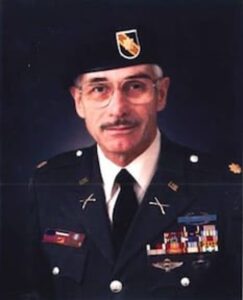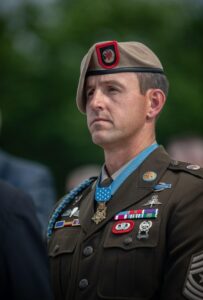Major John Duffy was born on March 16, 1938, in Brooklyn, New York. Although not much is known about his early life, one detail is certain: he was determined to make a life in the US Armed Forces. At 17, he enlisted in the US Army, and a few years later, he was commissioned as an officer. He became a Green Beret in the 5th Special Forces Group, and spent most of his military career in Vietnam. Duffy deployed four times: 1967, 1968, 1971, and 1973. He would become a highly decorated officer, with his brilliant leadership saving many lives during what would later become the battle that earned him the Medal of Honor.
The Will to Survive
On April 12, 1972, cracks began to show in the 11th Airborne Battalion stationed at Fire Support Base Charlie in the Central Highlands of Vietnam. The Southern Vietnamese commanding officer was killed in action, the command post was demolished, and the supplies — and morale — were running low. Duffy, who was twice wounded in the attack, refused medical help and evacuation. He knew the fates of the base and remaining soldiers were in his hands. He had to find a way to hold off the enemy until reinforcements came in.
On the morning of April 14, 1972, Duffy and his men, including Southern Vietnamese forces, were enveloped by enemy fighters from all sides. Duffy tried in vain to create a landing zone for resupply aircraft. He received a third wound from rifle fire but again refused evacuation. As the enemy bombed the base with artillery shells, Duffy openly exposed himself to instruct comrades as they targeted enemy fighters and weapons. His quick, strategic leadership resulted in a brief pause of battle. Duffy took the opportunity to redistribute the remaining ammunition to his men defending the base.
Eventually, enemy forces resumed fire, releasing as many as 300 rounds of ammunition on Duffy and his defenders. Through it all, Duffy put his personal safety at risk to direct gunfire on enemy targets. That afternoon, he moved around the base to provide counterfire, adjust positions, and lead attack efforts on his former position, which had been overrun with enemy forces. That evening, Duffy, using the code name Dusty Cyanide, started organizing a retreat for the 37 remaining men.
Early on April 15, 1972, Duffy and his men retreated toward the evacuation zone. The enemy continued to pursue them, so he created defensive positions to allow South Vietnamese forces to push back. Duffy continued directing gunfire as his men boarded the helicopters, and refused to climb aboard until every last man was safely in a chopper. As the aircraft pulled away, Duffy grabbed a South Vietnamese paratrooper who started falling out and pulled him back in. Then, he tended to a helicopter door gunner who had been wounded during the departure from base.
Turning Tragedy into Poetry
In all, Duffy has been awarded 64 awards for his incredible military service, including eight Purple Hearts, the Distinguished Service Cross, the Soldier’s Medal, four Bronze Stars with “Valor” device, seven Air Medals (six with “Valor” device), and countless others. But it wasn’t until 50 years after the fact that Duffy was bestowed the Medal of Honor for his selfless service and valiant efforts in Vietnam. On July 5, 2022, Duffy was recognized in a White House ceremony.
Following his retirement, Duffy moved to Santa Cruz, California, and had a successful civilian career. He founded a discount brokerage firm that TD Ameritrade purchased, ran a publishing company, and wrote poetry. He mostly wrote about his combat experiences as a way to document and pass down stories to future generations. Of his six poetry books, one was nominated for a Pulitzer Prize. His poem, ”The Forward Air Controller,” is inscribed on a monument in Colorado Springs, Colorado, to honor the sacrifices of FACs lost in combat. Duffy remains in California today.




